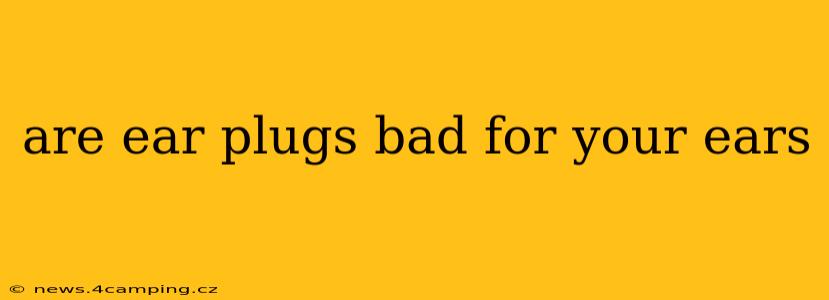The question of whether earplugs are bad for your ears is complex. The short answer is: not necessarily, but it depends on several factors, including the type of earplug, how you use them, and your individual ear health. While designed to protect your hearing, improper use or choosing the wrong type can potentially lead to issues. This article will delve into the details, addressing common concerns and providing guidance on safe and effective earplug usage.
Can Earplugs Cause Hearing Loss?
This is a major concern for many people. The good news is that properly fitted and used earplugs are unlikely to cause hearing loss. In fact, they often prevent hearing damage from excessive noise exposure. However, improperly inserted earplugs can sometimes cause a temporary reduction in hearing acuity due to blockage of the ear canal. This is usually temporary and resolves once the earplugs are removed. Using earplugs that are too large or too small can also lead to discomfort and potential irritation. The key is to select the right type and use them correctly.
What Types of Earplugs Are There, and Are Some Safer Than Others?
Several types of earplugs exist, each with its own pros and cons:
-
Foam earplugs: These are inexpensive, disposable, and readily available. However, they can sometimes be less effective at blocking noise than other types and may require more precise insertion for a proper seal. Improper insertion might also compress them too much, reducing their effectiveness and even causing discomfort.
-
Silicone earplugs: Reusable and often more comfortable than foam, silicone earplugs offer a good balance of noise reduction and comfort. They are available in various sizes and shapes, allowing for a more customized fit.
-
Custom-molded earplugs: These are made to the exact specifications of your ear canal, providing superior noise reduction and comfort. They're more expensive but offer the best protection and fit. They are often used by musicians, industrial workers, or those with specific hearing sensitivity needs.
-
Earplugs for Sleeping: These are typically softer and less bulky than earplugs designed for noise protection in loud environments, aiming to block out disruptive sounds without feeling overly intrusive while sleeping.
While all types can be safe when used correctly, the quality and fit can significantly impact their effectiveness and potential for causing irritation. It's crucial to choose a reputable brand and ensure proper insertion.
Can Earplugs Cause Ear Infections?
Using clean earplugs correctly significantly reduces the risk of ear infections. However, introducing bacteria or debris into the ear canal through dirty earplugs can increase the risk of infection. Always ensure your earplugs are clean before using them, and replace disposable ones regularly. If you experience any signs of infection (pain, discharge, or redness), consult a doctor immediately.
Are Earplugs Safe for Children?
For children, choosing age-appropriate earplugs is crucial. Foam earplugs are generally not recommended for young children due to the choking hazard. Silicone earplugs or custom-molded ones (under professional guidance) may be safer alternatives. Always supervise children when using earplugs and ensure they understand how to insert and remove them properly. Excessive noise exposure in children is particularly detrimental to developing hearing, making the safe use of earplugs even more important.
Are There Any Long-Term Effects of Using Earplugs?
With proper use and hygiene, there are generally no long-term negative effects associated with using earplugs. In fact, regular use can help prevent significant hearing damage in noisy environments, protecting your hearing health in the long run.
Conclusion
Earplugs are not inherently bad for your ears. Used correctly, they protect your hearing from harmful noise. However, selecting the right type, maintaining proper hygiene, and ensuring a good fit are essential. If you experience any discomfort or signs of infection, consult a medical professional. Prioritizing hearing protection through responsible earplug use is a crucial step in maintaining overall hearing health.
